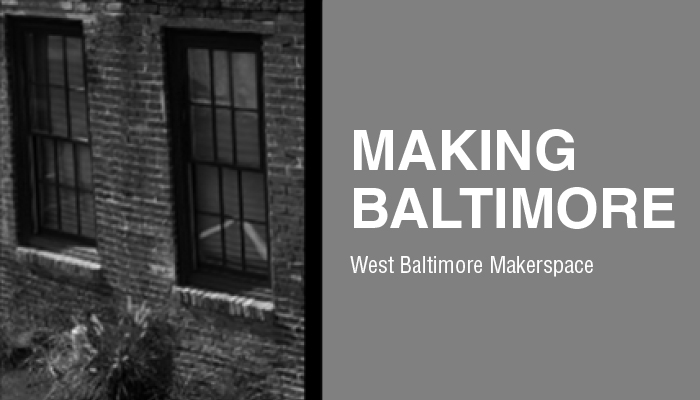

Many of us increase our charitable endeavors during the holidays — whether by volunteering at a soup kitchen, donating toys for needy children, or dropping coins in collection buckets. At KCIC, “giving back” is something we do year-round as a company and as individuals. It’s one of our Core Values to value each other as members of families and communities. Also, it’s in our DNA to solve challenging problems. We are very proud of Chris Crook, one of our developers, who shares below how he was moved to start a non-profit organization in Baltimore earlier this year.
I’ve lived in Baltimore the past five years and worked for KCIC for over six years. During the unrest last spring in Baltimore City, I was out of town representing KCIC at the annual RIMS conference, held this year in New Orleans. After watching the events back home unfold, through both traditional and social media, my original thought was to hunker down upon returning to a city occupied by National Guard troops and under curfew.
However, once back in Baltimore, I quickly realized a different kind of response was needed. I spent the next two days volunteering with a social media-organized group called #BaltimoreLunch that collected and distributed baby supplies to Gilmor Homes, one of the housing projects in the Sandtown-Winchester neighborhood — where many nearby corner stores and pharmacies were damaged or closed due to the unrest, making it impossible for citizens to get what they needed.
Seeing the National Guard Humvees in the area, the general blight, and even accidentally stumbling across the scene of an active shooting investigation, I saw that the unrest was a symptom of issues far deeper than solely the death of Freddie Gray in police custody. Baltimore’s economic stagnation and history of segregationist policy has left large swathes of the city in shambles, and the scale of human tragedy that exists is shocking to say the least. There are certainly two Baltimores.
Recognizing that the culmination of long-term conditions in the city were absolutely a factor in an area where economic prospects can leave many feeling hopeless, I decided to establish a new local non-profit — incorporating it on May 7, shortly after the curfew was lifted. I enlisted the help of some close friends as board members, including fellow Baltimorean, neighbor and KCIC manager Megan Shockley.
It’s called Making Baltimore Inc., and our mission is to empower the surrounding community by providing access to both tooling and resources for those who wish to personally develop any skills of their choosing. We want to offer a collaborative space in the heart of West Baltimore, where individuals can pursue projects and skills of interest to them, while working with others with varying levels of expertise. We hope to drive a return to creating things and personal development; a renaissance of craftsmanship in a city with a rich industrial history. This is what makerspaces are about: a community space with tools and a network of skilled individuals that promotes creativity, problem-solving, and the development of new skills through collaboration.
Making Baltimore Inc. embodies what has always helped me in life, particularly at KCIC: having valuable skills. For me, it started with an interest in technology; I was fortunate enough to have a computer at a young age, and I lived in an environment where curiosity and hard work were promoted. This same kind of environment continues at KCIC and certainly contributes to the success of the company.
Recently, besides technology, I’ve begun working with my hands more — doing home repairs around my place and building furniture with reclaimed lumber. The process of creating, whether digital or physical, is extremely satisfying, but I’ve learned that the overhead and capital expense of the equipment required can be oppressive, depending on one’s interests.
Our organization will distinguish itself by locating in a marginalized and predominately African-American section of the city — something few other makerspaces have done. It is critical to engage these communities that could benefit most from such a space. Harlem Park/Sandtown-Winchester suffers from an unemployment rate nearly twice that of the rest of the city, while wages earned by those who are employed are 40 percent lower than the rest of the city as a whole. We see providing the opportunity to learn additional skills as the only sustainable way to eliminate poverty.
In order to ensure our members have something to take away with them, we’re planning to leverage Mozilla’s OpenBadges to provide a sort of “skill resume” to showcase their interests and what they’ve learned. This doubles as a way to mitigate risk, by issuing safety badges to individuals who have taken the safety classes required to operate certain tools.
Volunteering at Gilmor Homes was the “give a man a fish” component of what I could do to fulfill an immediate need in my community, whereas Making Baltimore Inc. is the long-term, impactful, “teach a man to fish” component of what I feel I need to do for Baltimore. It’s the best I have to offer right now to better the lives of others, and I’m very excited that we have begun fundraising in order to make it a reality.
To learn more about our efforts and how you can support us or get involved as an instructor or advisor, please visit our website.
Never miss a post. Get Risky Business tips and insights delivered right to your inbox.

Chris Crook began at KCIC as a consultant, so he is intimately familiar with the host of challenges our clients face. Now on the technology side, he’s able to transfer that knowledge to provide cutting-edge technology platforms and implementations that support transformational problem solving for KCIC’s clients.
Learn More About Chris